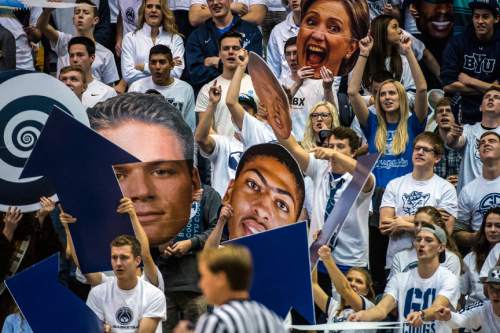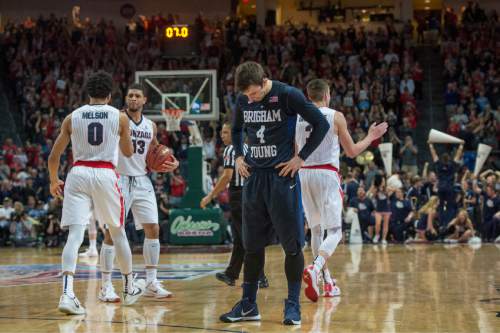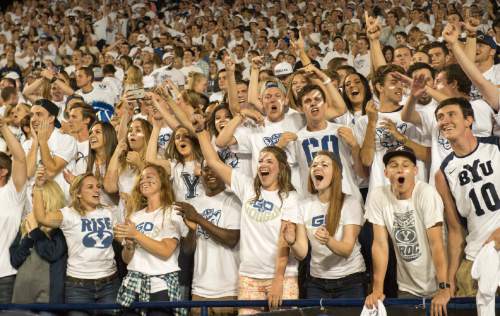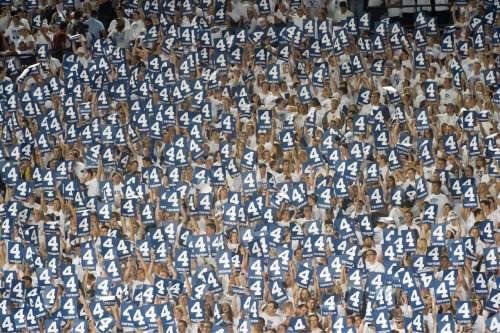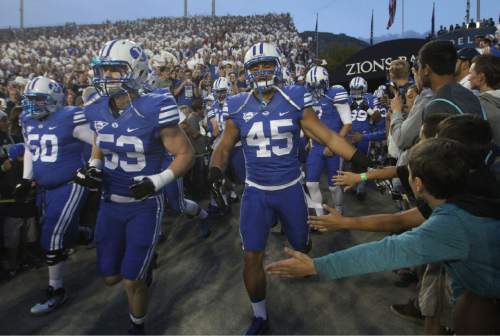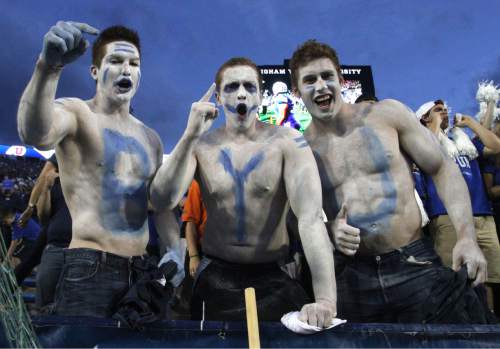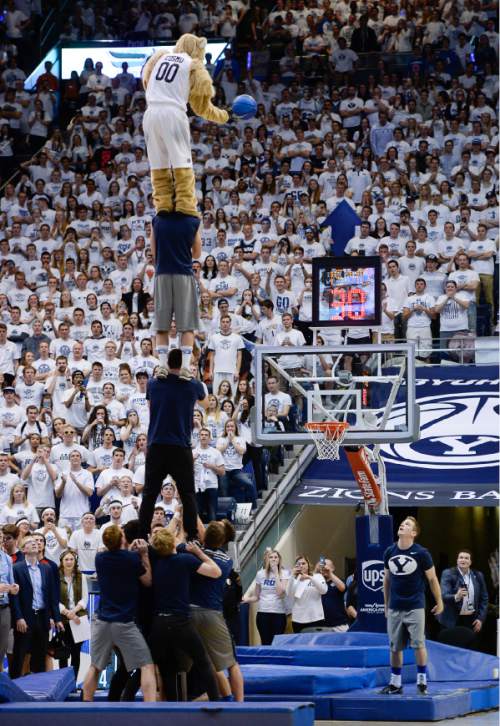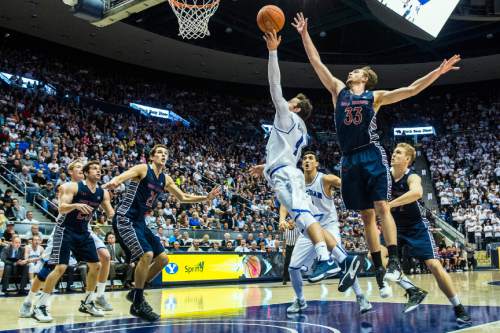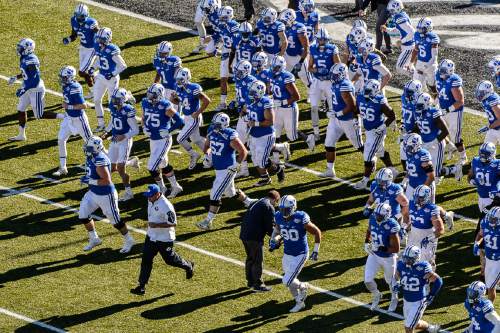This is an archived article that was published on sltrib.com in 2016, and information in the article may be outdated. It is provided only for personal research purposes and may not be reprinted.
Provo • When Utah held off BYU 35-28 in the Las Vegas Bowl last December, the loss didn't just end the 11-year Bronco Mendenhall era. It also signaled the end of the fifth season of football independence for the private school that broke away from the Mountain West Conference in 2011 and joined the West Coast Conference in most of its other sports.
How has football independence worked out for the Cougars? And how have they fared nationally and in the WCC after five years?
Some national observers, including Dennis Dodd of CBSSports.com, have termed the run as a college football rogue a failure; others closer to the program have deemed it a positive step after acknowledging some rocky scheduling patches the first few years. No one, however, is going so far as to call it a smashing success.
Like almost everything surrounding the polarizing and ever-intriguing world of BYU athletics, it probably comes down to one's perspective. Locally, there are haters and lovers, and few in between.
Most BYU fans seem to be mildly happy with the move.
"Though some complain the WCC was a step down in basketball, I think the WCC has provided great competition and generated some new rivals," said Presten Norton, a longtime fan who travels to almost every football and basketball game on the road. "The gyms may be smaller, but the quality has been great. As for football, who wouldn't trade Laramie and Albuquerque for the Big House [Michigan] and the Rose Bowl [UCLA]? I think it has been a huge success for football and basketball. Overall, I'm pleased with the transition and, in hindsight, I'd do it again."
Yet, Mendenhall started beating the "football-independence-isn't-sustainable" drum about two years ago — practically begging the Big 12 for an invite — while athletic director Tom Holmoe jumped on the ship a year or so later, admitting that the revenue gap between so-called Power Five conference schools and Group of Five schools and BYU was making it extremely difficult to stay competitive in football.
Still, Holmoe, who declined an an interview request for this story, said in January that BYU was holding its own, thanks to "having an advantage in other areas — human capital."
"I love that. I think that's a cool thing," Holmoe said. "There are teams out there that have a lot of money that can't do anything."
Football falls off
Mendenhall's BYU football teams went 43-22 in five years as an independent, including 10-14 against Power Five schools and Notre Dame. The Cougars were ranked at the finish of just one of those five seasons, and just barely. They ended up No. 25 in the USA Today coaches poll after beating Tulsa 24-21 in the 2011 Armed Forces Bowl to finish 10-3.
Turns out, that first year of independence was probably the best, considering the Cougars went 8-5 in each of the next three seasons, and then 9-4 last year. Perhaps more distressing to BYU fans is the fact that they are 0-4 as an independent against Utah.
BYU's record in its past five seasons in the MWC was 50-15 as Mendenhall recovered nicely from going 6-6 in its rookie season (2005) with 11 wins in 2006, 2007 and 2009 and 10 wins in 2008. With a freshman quarterback, Jake Heaps, in 2010, the Cougars went 7-6 in their final tour of the MWC but finished strong with a 52-24 pummeling of UTEP in the New Mexico Bowl.
They finished the 2006-2009 seasons with a national ranking of No. 21 or better all four seasons and were 7-5 against Power Five opponents in that stretch.
Obviously, BYU's overall schedule has been more difficult as an independent — it played twice as many P5 teams — so comparing win-loss records before and after isn't the best indicator of success. But folks in Provo generally believe it was the right decision. Mendenhall said so himself on his way out of town, pointing to the increased exposure independence brought, thanks to the contract BYU inked with ESPN.
Access to the Bowl Championship Series (BCS), and now the College Football Playoff and New Year's Six bowl games, was and still is a problem, Mendenhall allowed as he departed for Virginia.
BYU's Heisman Trophy winner, Ty Detmer, watched it all from Texas before joining Kalani Sitake's staff in December.
"I think just for the credibility and the national attention, yes, I think going independent was the right move," Detmer said. "I just think when Utah and TCU pulled out [of the MWC], that made it tougher to probably stay in and feel like you were going to have the national credibility that you need."
Still nationally relevant
Overall, the changes in 2011 have not harmed BYU's overall athletic program as much as many believed they would.
They are still a top-50 national program, and finished No. 30 in the Sports Directors' Cup standings for the 2015-16 school year, their best finish in that ranking of the nation's best Division I athletic programs since 2007, when they were 26th.
Their average ranking in the Directors' Cup standings as an independent and WCC member is 41st. Their average ranking in the five scholastic years preceding the move was 37th. From 1993-94, the inaugural year of the standings, until now, their average has been 31st.
While Utah's move to the Pac-12 has vaulted its football program past BYU's, the Utes still haven't overtaken the Cougars as owners of the state's top collegiate athletic program and aren't even trending in that direction. Utah finished 50th in the final standings released Friday, and has never finished ahead of BYU in the 23 years of the Directors' Cup's existence.
The average ranking for the Utes, who have two fewer sports than BYU, is 63rd. Since 2011-12, the year it joined the Pac-12, Utah has averaged 66th.
There was a stretch from 1996 to 2001 when BYU was a top-20 national sports program, with finishes of 18th or better all five of those years and a high of 12th in 1998-99. Rondo Fehlberg (1995-99), women's AD Elaine Michaelis (1995-2004) and Val Hale (1999-2004) were the athletic directors during those glory years.
WCC dominance
No question, football is the king of college sports, and the same applies at BYU. Once then-BYU president Cecil Samuelson, current president Kevin Worthen and Holmoe made the decision in 2010 to go independent in football (rival Utah's departure to the Pac-12 was obviously a motivating factor, along with the Mountain West's television situation), they had to find a place for their other sports because the MWC wasn't interested in letting them hang around in everything else. The WCC provided an acceptable, but lower-profile, spot.
As expected of the school with the only Division I football program in the conference and the biggest budget, BYU has become a big fish in a small pond, with the exception of men's basketball — where Gonzaga still rules and BYU has never won a conference championship.
The Cougars finished second behind five-time winner San Diego in the race for the Commissioners Cup in their first full year in the WCC. Since then, they've won four straight Cups, with sweeps of the men's and women's titles in three of those four years.
"While the pros and cons for Olympic sports can be debated, I think … when Indy/WCC is compared head-to-head with being a MWC member, there's not a single benefit to staying in the Mountain West," concluded Norton. "Now, if we were to talk Big 12 [admittance], well that's another story."
Twitter: @drewjay —
BYU's 5 seasons as a football independent
Overall Record • 43-22
Record vs. Power 5 Opponents/Notre Dame • 10-14
2011 • 10-3, defeated Tulsa 24-21 in Armed Forces Bowl, ranked 25th in coaches poll
2012 • 8-5, beat San Diego State 23-6 in Poinsettia Bowl, finished unranked
2013 • 8-5, lost to Washington 31-16 in Fight Hunger Bowl, finished unranked
2014 • 8-5, lost to Memphis 55-48 (2OT) in Miami Beach Bowl, finished unranked
2015 • 9-4, lost to Utah 35-28 in Las Vegas Bowl, finished unranked
Record in last five years in MWC (2006-10) • 50-15
BYU in all sports since joining the WCC
BYU's finish nationally in the all-sports Sports Directors' Cup since becoming independent in football, joining WCC in most other sports
2011-2012 • 43rd
2012-2013 • 43rd
2013-2014 • 42nd
2014-2015 • 48th
2015-2016 • 30th
Average since 2011 • 41st
Average in five years prior to move • 37th


